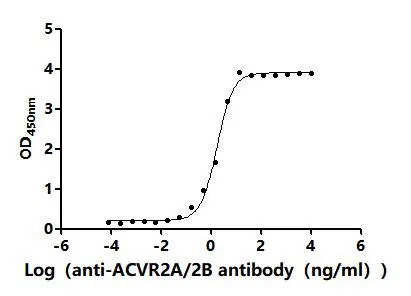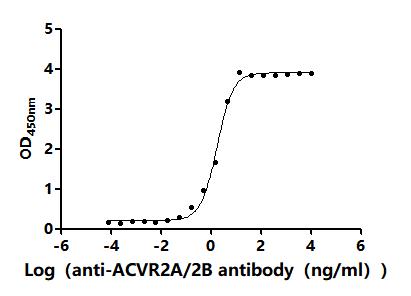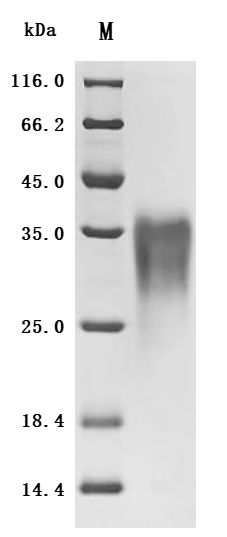Recombinant Mouse Activin receptor type-2A (Acvr2a) , partial (Active)
CAT:
399-CSB-MP001260MO1-02
Size:
100 µg
Price:
Ask
- Availability: 24/48H Stock Items & 2 to 6 Weeks non Stock Items.
- Dry Ice Shipment: No








Recombinant Mouse Activin receptor type-2A (Acvr2a) , partial (Active)
- CAS Number: 9000-83-3
- Gene Name: ACVR2A
- UniProt: P27038
- Expression Region: 20-135aa
- Organism: Mus musculus
- Target Sequence: AILGRSETQECLFFNANWERDRTNQTGVEPCYGDKDKRRHCFATWKNISGSIEIVKQGCWLDDINCYDRTDCIEKKDSPEVYFCCCEGNMCNEKFSYFPEMEVTQPTSNPVTPKPP
- Tag: C-terminal 10xHis-tagged
- Source: Mammalian cell
- Field of Research: Signal Transduction
- Assay Type: Active Protein & In Stock Protein
- Relevance: On ligand binding, forms a receptor complex consisting of two type II and two type I transmembrane serine/threonine kinases. Type II receptors phosphorylate and activate type I receptors which autophosphorylate, then bind and activate SMAD transcriptional regulators. Receptor for activin A, activin B and inhibin A. Mediates induction of adipogenesis by GDF6.
- Endotoxin: Less than 1.0 EU/ug as determined by LAL method.
- Purity: Greater than 95% as determined by SDS-PAGE.
- Activity: Yes
- Bioactivity: Measured by its binding ability in a functional ELISA. Immobilized Mouse Acvr2a at 2 μg/mL can bind Anti-ACVR2A&ACVR2B recombinant antibody (CSB-RA623829MA1HU). The EC50 is 1.562-1.966 ng/mL.
- Length: Partial
- Form: Lyophilized powder
- Buffer: Lyophilized from a 0.2 μm filtered PBS, 6% Trehalose, pH 7.4
- Reconstitution: We recommend that this vial be briefly centrifuged prior to opening to bring the contents to the bottom. Please reconstitute protein in deionized sterile water to a concentration of 0.1-1.0 mg/mL.We recommend to add 5-50% of glycerol (final concentration) and aliquot for long-term storage at -20℃/-80℃. Our default final concentration of glycerol is 50%. Customers could use it as reference.
- Molecular Weight: 14.8 kDa
- References & Citations: Activin A/ACVR2A aXIs inhibits epithelial-to-mesenchymal transition in colon cancer by activating SMAD2. Zhang H., Ruan Q., Chen C., Yu H., Guan S., Hu D., Yang C., Lin R., Zhuo C. Mol Carcinog 62:1585-1598 (2023)
- Storage Conditions: The shelf life is related to many factors, storage state, buffer ingredients, storage temperature and the stability of the protein itself. Generally, the shelf life of liquid form is 6 months at -20℃/-80℃. The shelf life of lyophilized form is 12 months at -20℃/-80℃.
- Protein Length: Partial
